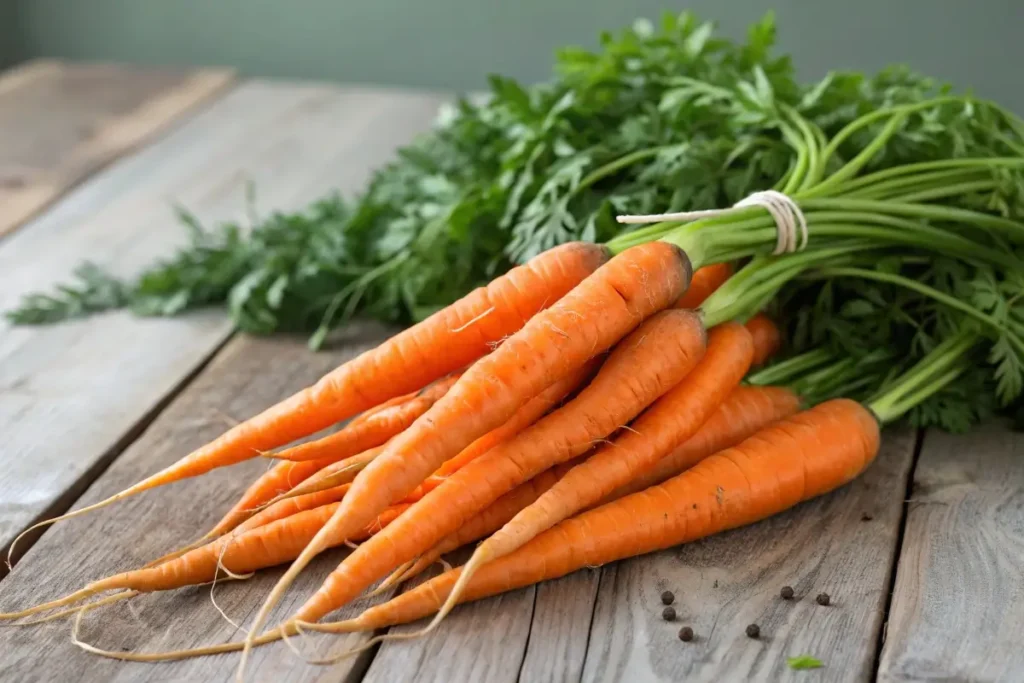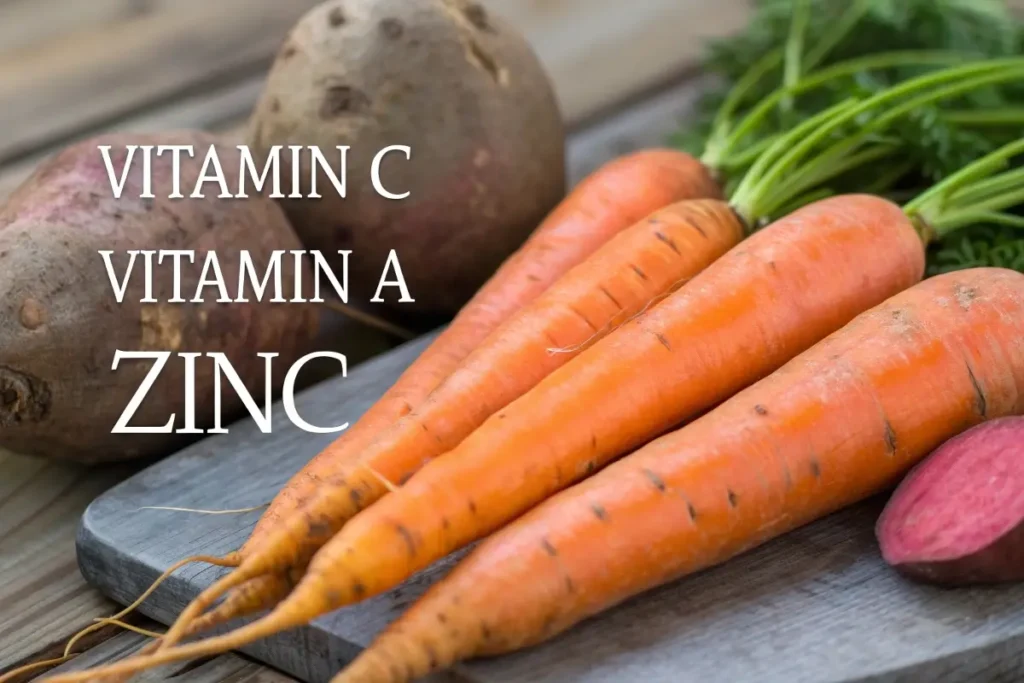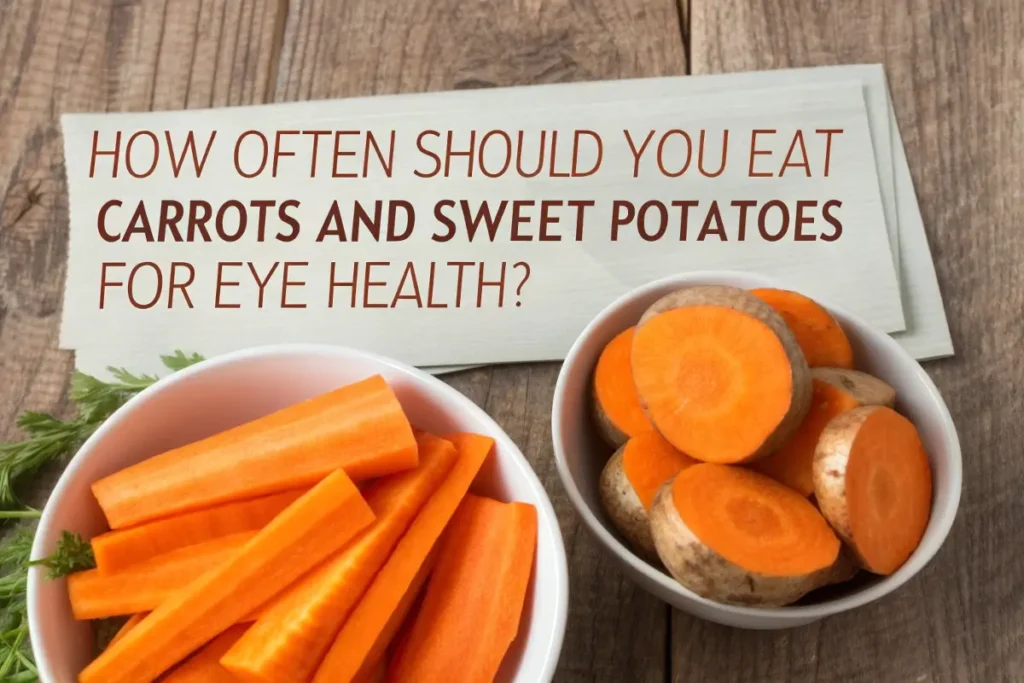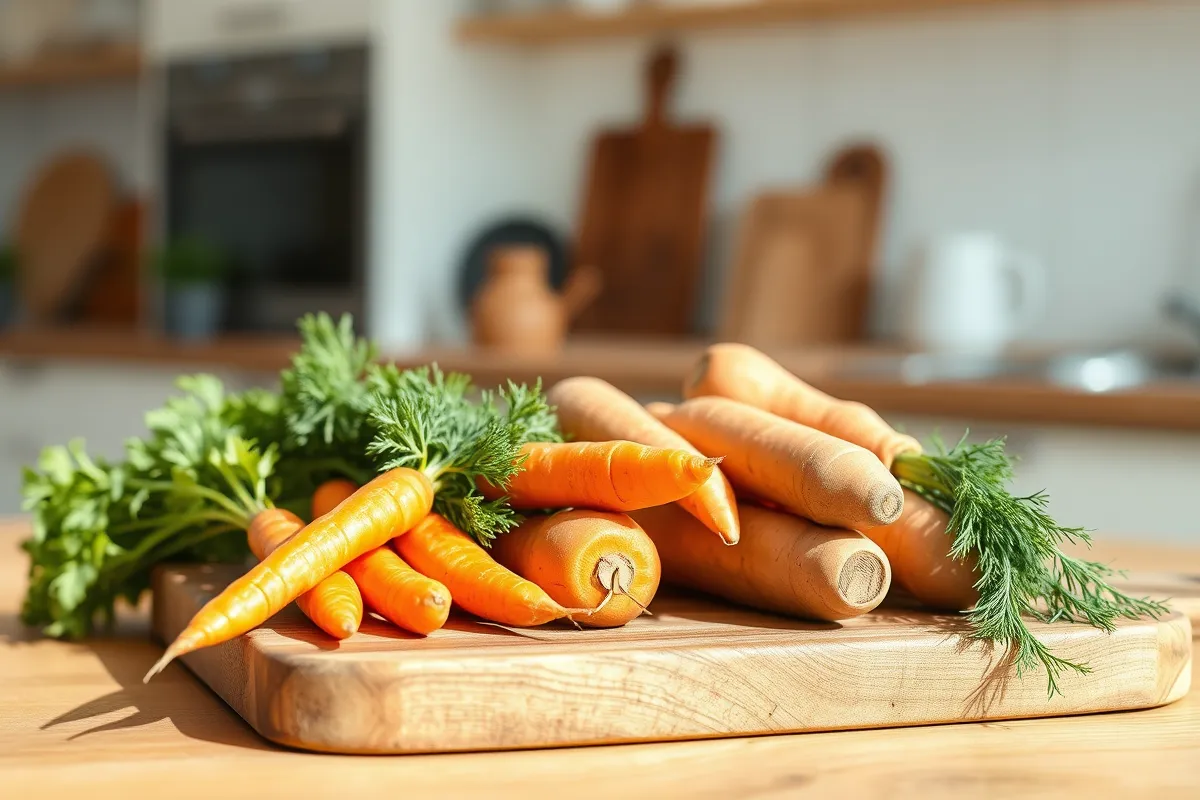Are carrots and sweet potatoes good for eye health? This is a common question for those wanting to maintain healthy vision through their diet. Carrots and sweet potatoes are both packed with nutrients, particularly vitamin A, which plays a crucial role in maintaining good eyesight. In this article, we will explore the relationship between these vibrant vegetables and eye health, diving into how their nutrients contribute to preventing vision problems and promoting overall eye wellness.
Why Are Carrots and Sweet Potatoes Good for Eye Health?
Vitamin A is a fat-soluble vitamin that is essential for vision, growth, and immune function. Carrots and sweet potatoes are rich in beta-carotene, which the body converts into vitamin A. This nutrient helps maintain healthy eyes, skin, and immune systems. Foods like carrots and sweet potatoes, rich in beta-carotene, are often considered “eye-friendly” foods.
Carrots and sweet potatoes are not only beneficial for the eyes but also easy to include in a variety of dishes. This makes them accessible for people of all ages to add to their meals without much hassle. Whether you enjoy them raw, cooked, or baked, these vegetables can be easily incorporated into your diet to support your overall well-being, especially your vision. Including these vegetables regularly will ensure that you reap the benefits of their rich nutrients, which help in maintaining healthy eyes and preventing age-related issues.
Nutritional Breakdown of Carrots and Sweet Potatoes
Understanding the nutritional content of these vegetables will help answer the question, are carrots and sweet potatoes good for eye health?
Carrots: The Vision-Boosting Powerhouse

Carrots are often associated with good eyesight, and for good reason. They are packed with beta-carotene, which is crucial for maintaining proper eye function.
- Beta-Carotene Content: One cup of raw carrots provides about 9,135 micrograms of beta-carotene, which is equivalent to 459 micrograms of retinol activity equivalents (RAE).
- Lutein and Zeaxanthin: Carrots also contain lutein and zeaxanthin, which help protect the eyes from age-related degeneration and harmful light exposure.
- Vitamin C and E: Carrots are also a source of vitamin C and E, both of which contribute to maintaining healthy eye tissues and preventing oxidative damage.
These nutrients make carrots an excellent choice for maintaining eye health and reducing the risk of developing vision problems.
Sweet Potatoes: A Vitamin A Powerhouse
Sweet potatoes are another root vegetable rich in nutrients that support eye health. They are known for their sweet taste and vibrant color, which is an indication of their high beta-carotene content.
- High in Beta-Carotene: One medium-sized baked sweet potato contains around 21,909 micrograms of beta-carotene, which translates to approximately 1,096 micrograms of RAE. This makes sweet potatoes one of the richest sources of vitamin A.
- Rich in Antioxidants: Sweet potatoes are high in antioxidants, including beta-carotene, which helps neutralize free radicals and protect the eyes from damage.
- Lutein and Zeaxanthin: Sweet potatoes also contain small amounts of lutein and zeaxanthin, which help filter harmful blue light and protect the retina.
How Do Vitamin A, Lutein, and Zeaxanthin Support Eye Health?
Are carrots and sweet potatoes good for eye health because of their vitamin A content? Absolutely! Vitamin A, lutein, and zeaxanthin all play vital roles in keeping the eyes healthy.
1. Vitamin A and Night Vision
Vitamin A is critical for night vision. It helps produce the pigments in the retina that allow the eyes to adapt to low light conditions. A deficiency in vitamin A can lead to night blindness, a condition where individuals have difficulty seeing in dim light.
- Beta-Carotene Conversion: The body converts beta-carotene into retinol, the active form of vitamin A. This conversion helps maintain healthy vision and prevent conditions like night blindness.
- Deficiency Risks: Without adequate vitamin A, the eyes cannot produce enough moisture, leading to dryness and potential corneal damage.
2. Lutein and Zeaxanthin: Natural Blue Light Filters
Lutein and zeaxanthin are antioxidants that are naturally found in the retina. They act as natural blue light filters, protecting the eyes from harmful light exposure.
- Reducing Age-Related Degeneration: These antioxidants help reduce the risk of age-related macular degeneration (AMD), which is one of the leading causes of vision loss in older adults.
- Improving Visual Acuity: Lutein and zeaxanthin are also known to improve visual acuity by filtering blue light and reducing glare, which helps enhance vision quality.
Benefits of Carrots and Sweet Potatoes for Specific Eye Conditions
Are carrots and sweet potatoes good for eye health when it comes to specific conditions like cataracts, macular degeneration, and dry eyes? Let’s explore how these vegetables can help.
1. Age-Related Macular Degeneration (AMD)
AMD is a common eye condition that affects the macula, the central part of the retina responsible for sharp vision. Both carrots and sweet potatoes contain nutrients that can help reduce the risk of developing AMD.
- Beta-Carotene: Beta-carotene helps maintain healthy vision and protects against oxidative damage, which contributes to the development of AMD.
- Lutein and Zeaxanthin: These antioxidants are also linked to a reduced risk of AMD by protecting the retina from harmful light exposure.
2. Cataracts
Cataracts occur when the lens of the eye becomes cloudy, leading to blurred vision. Antioxidants like vitamin A, C, and E play a role in reducing the risk of cataract formation.
- Vitamin C and E: Carrots and sweet potatoes contain vitamin C and E, which help protect the eye lens from oxidative stress and reduce the likelihood of cataract development.
- Role of Beta-Carotene: The beta-carotene in these vegetables helps maintain lens clarity, which is essential for preventing cataracts.
3. Dry Eyes
Dry eyes occur when the eyes do not produce enough tears, leading to irritation and discomfort. Vitamin A plays a crucial role in maintaining healthy tear production.
- Maintaining Moisture: Vitamin A helps maintain moisture in the eyes, preventing dryness and irritation. Consuming carrots and sweet potatoes can help ensure that the body has enough vitamin A to support tear production.
- Protection Against Corneal Damage: A deficiency in vitamin A can lead to corneal damage, which may worsen dry eye symptoms.
How to Incorporate Carrots and Sweet Potatoes into Your Diet for Eye Health
Including carrots and sweet potatoes in your diet is a simple and effective way to support eye health. Here are some delicious and easy ways to incorporate these vegetables into your meals:
1. Carrot-Based Recipes
- Raw Carrot Sticks: Enjoy raw carrot sticks as a crunchy snack paired with hummus or a light dip.
- Carrot Soup: Blend cooked carrots with vegetable broth, ginger, and garlic for a comforting and nutritious soup.
- Carrot Salad: Shred carrots and mix them with raisins, a splash of lemon juice, and a bit of honey for a refreshing side salad.
2. Sweet Potato Recipes
- Baked Sweet Potatoes: Bake a sweet potato in the oven until tender, then top with a sprinkle of cinnamon for added flavor.
- Sweet Potato Mash: Boil sweet potatoes and mash them with a bit of nutmeg and Greek yogurt for a creamy side dish.
- Sweet Potato Fries: Cut sweet potatoes into wedges, toss with olive oil, and bake until crispy for a healthier alternative to traditional fries.
The Science Behind Beta-Carotene Absorption
To answer the question, are carrots and sweet potatoes good for eye health, it’s important to understand how the body absorbs beta-carotene. Beta-carotene is a fat-soluble compound, meaning that consuming it with a small amount of healthy fat can improve absorption.
1. Pair with Healthy Fats
- Olive Oil: Drizzle carrots or sweet potatoes with a small amount of olive oil before roasting them. This will help improve the absorption of beta-carotene.
- Avocado: Pair a carrot or sweet potato salad with avocado to enhance nutrient absorption.
2. Cooking Methods Matter
The way you prepare carrots and sweet potatoes can affect how much vitamin A you absorb. Cooking can break down the cell walls of these vegetables, making beta-carotene more available for absorption.
- Steaming: Steaming carrots and sweet potatoes helps preserve their nutrients while making them easier for the body to absorb.
- Roasting: Roasting these vegetables is another effective way to enhance their flavor and improve nutrient absorption, especially when paired with healthy fats.
Other Nutrients in Carrots and Sweet Potatoes That Support Eye Health

In addition to vitamin A, carrots and sweet potatoes contain several other nutrients that contribute to eye health:
1. Vitamin C
- Antioxidant Protection: Vitamin C is a powerful antioxidant that helps protect the eyes from oxidative damage. It also supports the health of the blood vessels in the eyes.
- Sources: Carrots contain small amounts of vitamin C, which can contribute to overall eye health when consumed as part of a balanced diet.
2. Vitamin E
- Eye Tissue Protection: Vitamin E helps protect eye tissues from free radical damage. It works synergistically with vitamin A to promote healthy vision.
- Sources: Both carrots and sweet potatoes contain some vitamin E, which can contribute to reducing the risk of cataracts and age-related vision issues.
3. Zinc
- Vitamin A Metabolism: Zinc is essential for vitamin A metabolism, helping convert beta-carotene into active vitamin A. Without adequate zinc, the body may not efficiently use the beta-carotene found in carrots and sweet potatoes.
How Often Should You Eat Carrots and Sweet Potatoes for Eye Health?

Are carrots and sweet potatoes good for eye health when eaten frequently? Absolutely! Consuming these vegetables a few times a week can help you meet your vitamin A needs and support overall eye health. Here are some tips on how often to include them in your diet:
- Daily Snacking: Snack on raw carrot sticks or baked sweet potato fries as a daily healthy snack option.
- Weekly Meal Planning: Include roasted carrots and sweet potatoes as side dishes in your weekly meal plan. This will ensure you get a consistent supply of vitamin A and other eye-supporting nutrients.
- Variety is Key: Try different cooking methods and recipes to keep things interesting and ensure you get the most nutritional benefit from these vegetables.
Frequently Asked Questions
1. Are Carrots and Sweet Potatoes Good for Eye Health?
Yes, both carrots and sweet potatoes are excellent for eye health. Their high beta-carotene content helps maintain healthy vision and prevent conditions like night blindness.
2. How Does Vitamin A Improve Vision?
Vitamin A is crucial for maintaining the health of the retina and improving night vision. It helps produce pigments necessary for the eye to adapt to low light conditions.
3. Can Eating Carrots and Sweet Potatoes Prevent Cataracts?
While eating carrots and sweet potatoes cannot guarantee cataract prevention, their high antioxidant content can reduce the risk by protecting the eye lens from oxidative damage.
4. How Should Carrots and Sweet Potatoes Be Prepared for Optimal Eye Health?
Cooking these vegetables with a small amount of healthy fat, like olive oil, enhances beta-carotene absorption. Steaming or roasting are ideal methods.
5. How Often Should I Eat Carrots and Sweet Potatoes for Eye Health?
Including carrots and sweet potatoes in your diet a few times a week can help maintain good eye health and provide essential nutrients like vitamin A.
Conclusion: Are Carrots and Sweet Potatoes Good for Eye Health?
Are carrots and sweet potatoes good for eye health? The answer is a resounding yes! Both vegetables are rich in vitamin A, lutein, and zeaxanthin, which are vital for maintaining good vision and protecting the eyes from various conditions. Incorporating carrots and sweet potatoes into your diet regularly can help reduce the risk of eye-related issues such as night blindness, macular degeneration, and cataracts.
Enjoy these nutrient-rich vegetables in a variety of ways, from raw snacks to roasted dishes, to support your eye health and overall well-being. Remember to pair them with healthy fats for maximum vitamin A absorption, and make them a staple in your diet for optimal results.
